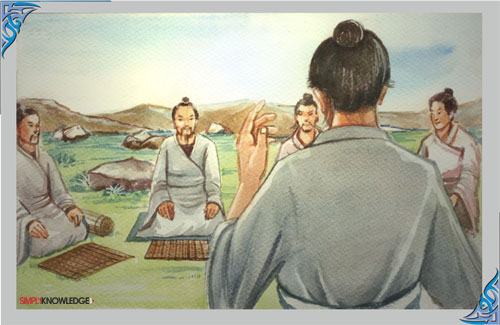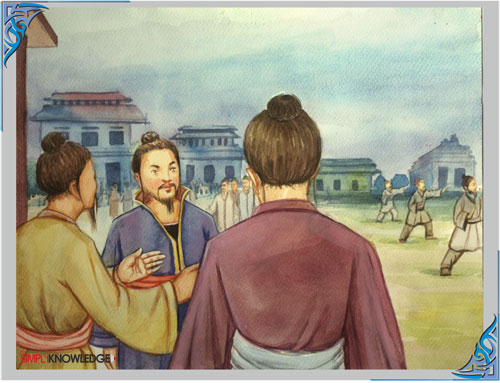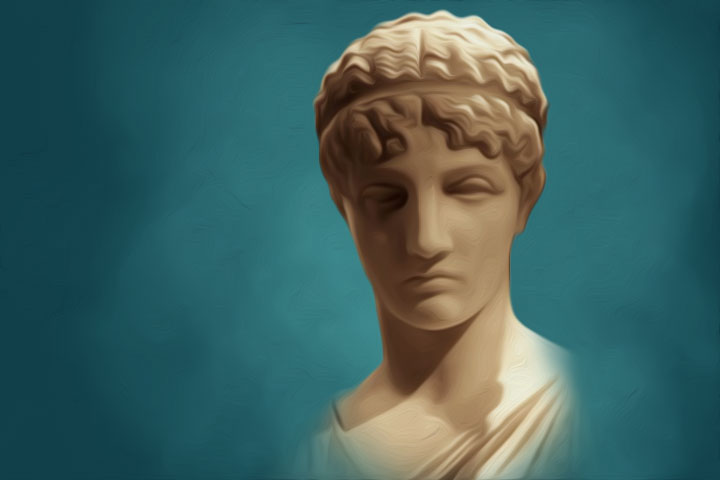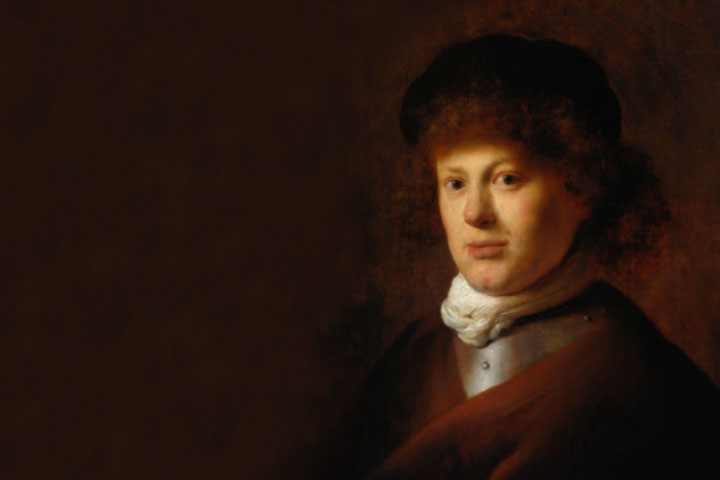
Introduction
“In prosperous conditions, the worthy must be promoted. In adverse conditions too, the worthy must be promoted. Honouring the worthy forms the basis of good government. Virtuous who are prosperous must be exalted, and the virtuous who are not as fortunate are also worthy of exaltation. Petty poachers condemned by the people and punished by the government. Why? Because of their malevolent action that harms others for their own profits. Similarly, thieves who steal animals are considered relatively more unrighteous because their evil acts harm a much larger population. Murderers are dangerous because they are a threat to the society. The righteous consider it their privilege to condemn such criminals and brand them as felonious. Yet, when people commit greater offenses such as war which affects a multitude, the righteous do not condemn it. Instead, they glorify such aggression as virtuous or patriotic.”
Paradoxical yet unpretentious, antipodal but veritable, this statement by Mo Tzu, is self explanatory. It astutely describes the insidious characteristic of humans who easily debase a wealthy virtuous or worthy person while debasing such an entity in adversity. Similarly, the society and laws of the land condemn and penalize petty thieves while glorifying those who indulge with impunity in massacre, pillage and plunder during wars by labelling it as patriotism.
Mo Tzu said these words during a dialogue with a Chinese ruler sometime in the late 5th Century BC. Yet, 2,500 years later, his words ring true: Felons and murderers are punished by law while those who commit war crimes are glorified as heroes while their heinous acts justified, pardoned and sometimes rewarded under the guise of patriotism.
Mo Tzu was not an ordinary thinker of his era. Indeed, he is credited as being the first and ancient Chinese psychologist who is considered as an apt contender of Confucius. Indeed, several teachings of Mo Tzu clash with those of Confucius to an extent it split ancient Chinese thinkers into two groups. Further, he took concrete steps to prevent exploitation of the weak- an accolade no other ancient Chinese thinker is credited with. For his efforts to prevent wars, he is often compared often to Sun Tzu, the father of war psychology while other thinkers state his teachings surpass those of Lao Tzu, the founder of Taoism.
Regardless of the accolades showered upon Mo Tzu, his works and teachings indeed had great bearing on ancient China, whose motley kingdoms were at frequent wars when he was born and during his lifetime.

Birth
There are several stories regarding the birth and ancestry of Mo Tzu. The widely accepted and credible one states, he was born in the Lu state of ancient China in 470BC into a family of artisans- one of the lowest social classes of China during that era. His parents’ names are not recorded.
There are also some disputes about Mo Tzu’s real name. Ancient chroniclers attribute several anecdotes stating the newborn Mo Tzu was given a different name but acquired his later name Mo Di or Mo Ti because of his dark complexion, which was similar to ink , called ‘Mo’ in Chinese. And the word ‘Tzu’ means teacher- a title he was accorded much later.

life
Not much is known about Mo Tzu’s life and education. From his works and comparison with works and prevailing conditions in China, it is evident he was born in the ancient Lu state, which is now in Shandong, China- the same region where another Chinese ancient thinker, Confucius hailed from.
Hence, historians infer that young Mo Tzu studied at a Confucian school, which was both prestigious during the era for its teachings which were widely accepted and accepted students from all walks of life without charging fees- complying with its founder- Confucius’- axioms.
But Mo Tzu was disenchanted by Confucian teachings since they spoke about ethereal virtues rather than addressing pragmatic issues confronting rulers and people. He believed Confucian doctrines were more theoretical instead of practical and resolved to address the issue by breaking away from the school.

travels
Exasperated by disinterest in some doctrines he had formed while studying at the Confucian school, Mo Tzu decided to travel and preach his theories to kings and commoners, as he believed his teachings were more relevant to that era when ancient Chinese states were constantly at war against one –another for territorial gains, in the absence of one strong power who could unite the country.
Initially, his doctrines were reviled by some and appreciated by a few. Determined, Mo Tzu continued his travels, expounding his theories about various issues. But at last, Mo Tzu’s teachings found some degree of recognition with the ruler of the state of Song, now a part of the Henan province in central China. The king of Song state appointed him as minister to revamp his social, military, legal and government systems.
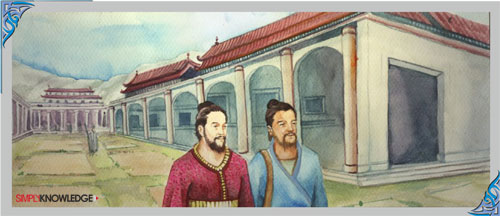

Rise of the Mohists
Encouraged by the duties entrusted by the ruler of Song, the great teacher began drawing elaborate plans for reforming the state. He first authored his doctrine, called the ‘The Chapters’for this arduous task, which later became the handbook for several rulers seeking ideal governance and peace with neighbours, apparently to counter the long years of war and discontent among the populace. Armed with these ‘The Chapters’, Mo Tzu began restructuring the local society on lines of a spiritually awakened military, which spread across the Song kingdom rapidly. Mo Tzu had authored over 70 chapters of which 10 are considered the core of his teachings.
The followers of this doctrine propounded by Mo Tzu were termed as Mohists. And the ‘Ten Chapters’ which encapsulated his doctrines were literally the equivalent of the Biblical Ten Commandments for these followers of Mo Tzu.

The ‘Ten Chapters’
Some fragments of the original treatise are lost to antiquity. However, whatever is extant is a clear indicator of Mo Tzu’s psychology. Synopsized, the ‘Ten Chapters’ are as follows:
Shang Xian: Means ‘Honouring the Worthy’. This chapter discusses Mo Tzu’s teaching of honouring worthy rulers acclaimed for their good governance. He emphasizes the importance of designating capable citizens to high offices in a government, ensuring they are amply remunerated and given sufficient powers to conduct their duties without hindrance by those in power or avarice. Mo Tzu strongly opposes nepotism and appointment of untalented officers to such positions.
Shan Tong: or ‘Encouraging Unity. Here, Mo Tzu speaks about the general or unified perception about the majority of what they consider as morally correct. These morally sound concepts are to be incorporated by rulers and their senior officers to provide good governance based on a proper socio-political order.
Here, Mo Tzu discusses the hierarchy of a society with the populace at the lower rung of the echelon, nobles in the centre and rulers at the highest level of the social structure. And above the ruler are the deities.
Jian Ai: This is a concept that implies ‘Universal Care’ as propounded by Mo Tzu. One of them most important teachings, Mo Tzu says, individuals possess an insidious tendency to accrue profits for themselves, their family and friends while neglecting the needs of strangers
Hence, they are callous in amassing wealth or deriving benefits through immoral methods from such strangers, despite such gains being morally inappropriate. Hence, the populace should also show appropriate piety to such aliens by treating them as peers and not taking undue advantage.
Fei Gong: In this chapter, Mo Tzu discusses the pros and cons of wars. He states, aggression of any kind is morally unacceptable since it leads to immense sufferings for the populace of all warring parties. However, Mo Tzu also justifies warfare as an evil necessity when it is conducted to liberate people from oppression and tyranny and only if the aggressor or defender is a righteous ruler who governs virtuous subjects and a disciplined army that will not go on rampage to plunger and pillage citizens of the defeated kingdom.
Jie Yong: Translated, it means proper handling of the state’s exchequer and control over the ruler’s personal expenses. Mo Tzu says, a righteous ruler should limit personal expenses to the bare minimum to set an example for the citizens. He derides rulers who spend from the country’s coffers by indulging in opulence.
Interestingly, Mo Tzu also lays some foundations for a national budget with emphasis on military expenses and civil infrastructure, stating they should be developed according to tangible threat perceptions and to provide for the short, medium and long term needs of the state.
Jie Zhang: A direct attack on Confucian tenets that demand strict compliance with ancient rituals. Mo Tzu, in this chapter, states grandiose funerals as stipulated by Confucius and his followers to adhere to ancient customs, especially those pertaining to royals and aristocrats are a waste of the state’s income since they serve no purpose other than satisfying bloated egos.
He lashes out at long state mourning stretching over days, since these inevitably disrupt normal lives of people and hence useless since they do not provide any solution to real problems faced by the state. Instead, they cause hardships to people in various ways such as disrupting their sources of income and depleting public funds without gain. This money, he states, could be utilized for better purposes and hence, calls for abolition of such elaborate funerals, ceremonies and expensive last rites.
Tiang Zhi: Mo Tzu assails Confucius and his teachings once again through this chapter. ‘Tiang Zhi’, meaning Divine Will, he says, does not exist since Gods do not interfere directly with human life. He says deities reward the righteous and punish evildoers. Hence, “divine justice” is imminent and inevitable for wrongdoers since it has a moral basis.
Ming Gui: This chapter discusses the benefits of belief in Gods and angels by rulers and their subjects. Mo Tzu said, when rulers and their populace believe in an all encompassing God and his angels, they refrain from evil deeds. He argues that angels indeed exist and they facilitate the virtuous to spread overall wellbeing. Hence, if rulers and their subjects are righteous, they are entitled to divine assistance from such angels and God.
Fei Yui: Yet another assault on Confucianism, the term ‘Fei Yui’ derides Confucius’ axiom that folk music and entertainment aims at educating people while helping them maintain harmony. Mo Zhu debases these teachings saying music and entertainment are an unnecessary expenditure incurred by royals.
While Mo Tzu explicitly states he is not opposed to people enjoying music or entertaining themselves, he propounds such arts be performed on special occasions, in moderation and to help people identify themselves with moods and themes to become more virtuous rather than odious appreciation of frivolous songs, dance and plays.
Fei Ming: A rather complex chapter to comprehend, Mo Tzu emphasizes that all doctrines be tested on their various merits. He states, passing at least three tests are necessary for any doctrine to be verified as feasible for implementation.
In the first of these, which deals with fatalism, Mo Tzu propounds that individual or collective wisdom and its correlated action have no bearing on the final results, is a misconception.
In the first of these, which deals with fatalism, Mo Tzu propounds that individual or collective wisdom and its correlated action have no bearing on the final results, is a misconception.
Individuals or rulers who believe the final outcome of their thoughts and actions are indeed unwise and such thoughts can prove disastrous since they can mislead people into committing wrong deeds. In this chapter, he also tests his own doctrine stating it should be evaluated according to its results and not merely accepted in principle. This chapter is a very lengthy debate by Mo Tzu about the pros and cons of his doctrines.

Theories in Practice
By all accounts, Mo Tzu was extremely hard working, and travelled far and wide to propagate and practice his teachings. He was welcomed everywhere he visited since his doctrines were aimed at the general wellbeing of every society, regardless of its ethnicity, geographical boundaries or demographics. Several ancient and modern psychologists aver, Mo Tzu was altruistic, focusing on the welfare of others with scant regard for wealth, fame or health.
Confucian student, Meng Zhi also credits Mo Tzu despite several doctrinal differences between the two schools of thoughts. Indeed, Meng Zhi states in his treatise, the ‘Meng Zhi Jin Shin’ that Mo Tzu would never flinch from undertaking any venture if it meant good for the people in general. Ancient Chinese historian Zhang Taiyan goes further and opines, the achievements of Confucius and Lao Tzu fade in comparison with those of Mo Tzu.
According to ancient historians, Mo Tzu, despite his advancing age, travelled to every warring state of China to convince their rulers to desist from armed conflicts since it entailed only misery for both, the victor and the loser. One anecdote states, Mo Tzu walked for a fortnight to the Chu state to stop the ruler from mounting an attack on the Song kingdom.
At the behest of the ruler of Chu, he conducted a series of military exercises with the Chu’s general, Guangshu Ban. Mo Tzu abrogated all the training and military planning of Guangshu Ban, who was so infuriated, he planned to kill the great thinker. However, Mo Tzu bluffed the general claiming his pupils had coached the Song army and hence, executing him would be futile. This effort is claimed to have averted a war between the Chu and Song states, saving thousands of lives of soldiers and civilians.
Mo Tzu is also credited with preventing a war between the states of Qi and Lu by teaching their rulers that victory does not merely depend upon military might but also the virtues of the citizens. Hence, if the subjects of any defeated king are virtuous, they will continue to resist foreign rule, especially tyranny.

Death
The great master Mo Tzu is believed to have passed away at the age of around 80 years, in or around 392BC. Details such as the place of his death and causes are unknown but given his age, it is most likely he died of old age.

Legacy
With ancient China underwent severe political and social turmoil from 480BC to 220BC, a period that is termed as the ‘Era of the Warring States’, Mo Tzu’s teachings had far reaching implications, despite his death. The Mohists, or his followers, kept his teachings alive for nearly 200 years after the demise of their master by travelling to various parts of China, though the wars had ended in 220BC, with the victory of the Qin state which unified the country.
Rulers and citizens, suffering from war fatigue, bereaving over their beloved ones who fell martyr during these frequent armed conflicts turned to Mohism to find an ideal way of governance and citizenry while attempting to prevent such unprecedented bloodshed in future. But as conflicts ebbed and China witnessed peace, Mohism faded into obscurity and its tenets were relegated to mere academic interest as history instead of psychology. Several works by Mo Tzu and his disciples were lost and great parts of the Mohist teachings faded into oblivion for over two millennia.

Revival of Mohism
During the 20th Century, some Chinese scholars began unearthing works of Mo Tzu and other Mohists. The work was rather painstaking since it involved deciphering whatever texts had survived from ancient Chinese to the modern version. What they found was so astounding that Mohism became one of the most difficult psychologies to understand among what is called the ‘Ancient Chinese Hundred Schools of Thoughts’.
The efforts of these unknown Chinese scholars of the 20th Century bore rich rewards: Politicians in the US and later, the Bolsheviks, who formed the Union of Soviet Socialist Republics, attempted to emulate Mo Tzu’s teachings in their techniques of governance. As is well known, the US and USSR gained the status as the world’s first two superpowers.
Today, Mo Tzu is a well studied psychologist of ancient China, whose works would have been of great importance to the world, if they had been well preserved and prevented from fading into obscurity. To date, efforts continue in China to unearth the lost work of the Mohists and their master, Mo Tzu.
Next Biography





